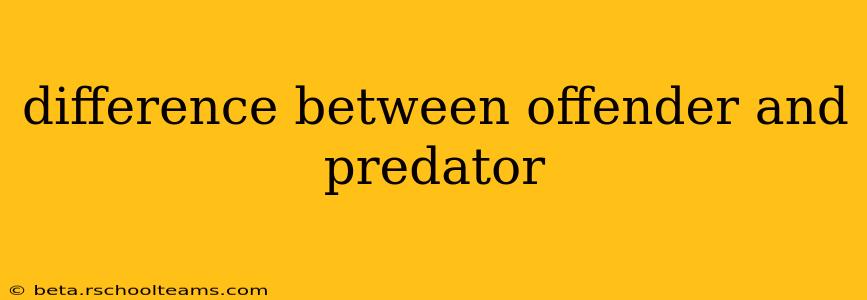The terms "offender" and "predator" are often used interchangeably, especially in casual conversation, but there are crucial distinctions between them, particularly within the context of criminal justice and victimology. While both terms refer to individuals who have committed harmful acts, the connotations and implications differ significantly. This article will delve into these differences, exploring the semantic nuances and practical applications of each term.
What is an Offender?
An offender is a broad term encompassing anyone who has violated a law and been convicted of a crime. This definition is inclusive, ranging from minor infractions like speeding tickets to serious felonies such as murder. The severity of the offense is not inherently part of the definition; it simply signifies the violation of a legal statute. An offender's actions are considered illegal, and they have been held accountable through the legal system. The focus is primarily on the act itself and the legal consequences that follow.
What is a Predator?
A predator, on the other hand, carries a much stronger connotation of premeditation, manipulation, and a pattern of behavior targeting specific vulnerable victims. It suggests a deliberate and calculated approach, often involving grooming, stalking, or other manipulative tactics to exploit individuals. Predators typically exhibit a consistent pattern of harmful behavior, rather than a single isolated incident. While predation can certainly involve criminal offenses, the term emphasizes the nature of the offending behavior—the deliberate targeting of vulnerable individuals for exploitation.
What is the Key Difference Between an Offender and a Predator?
The core distinction lies in the intent and pattern of behavior. An offender may commit a crime impulsively or out of anger, while a predator actively seeks out opportunities to harm others, often exhibiting a calculated and methodical approach. Predators often target vulnerable individuals who are less likely to resist or report the abuse. This difference is crucial in understanding the risk posed by each individual and the necessary interventions for prevention and rehabilitation.
Are All Predators Offenders? Are All Offenders Predators?
All predators are offenders, as their actions constitute criminal offenses. However, not all offenders are predators. Many offenders commit crimes impulsively, out of desperation, or under the influence of substances, without exhibiting the manipulative and pre-meditated patterns characteristic of predators.
How Do These Terms Apply in Different Contexts?
The context in which these terms are used significantly impacts their meaning. In a legal setting, "offender" is a more formal and neutral term used in official documentation and legal proceedings. "Predator" is often used in more informal settings or within the context of discussions about specific types of crimes, such as child sexual abuse, where the manipulative and predatory nature of the offender's actions is emphasized.
What are the Implications of Labeling Someone a Predator?
Labeling someone a "predator" carries significant weight and social consequences. It can lead to public outrage, stigmatization, and difficulty in reintegrating into society, even after serving a sentence. This label should be applied judiciously and only when supported by evidence of a pattern of predatory behavior.
Conclusion
While the terms "offender" and "predator" are related, they are not interchangeable. Understanding the nuanced differences is crucial for accurate communication, effective crime prevention, and appropriate responses to criminal behavior. The term "predator" highlights the specific characteristics of calculated, manipulative, and repetitive harm inflicted upon vulnerable individuals, setting it apart from the broader term "offender." Accurate terminology is essential for both legal proceedings and public understanding of the complexities of criminal behavior.
